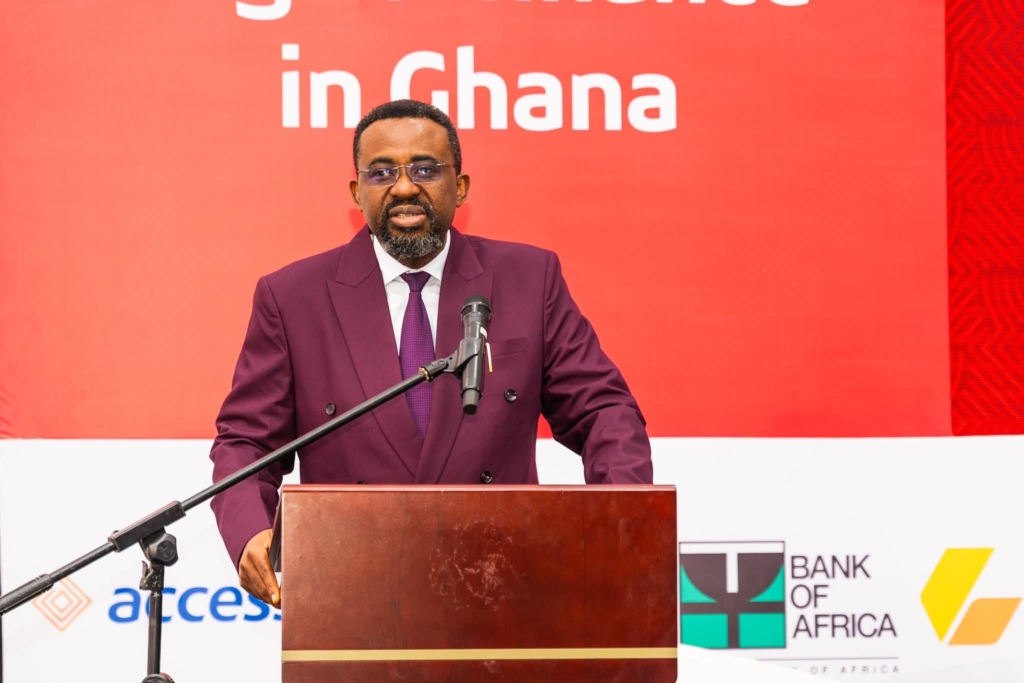Governor of Bank of Ghana, Dr. Johnson Asiama
The Governor of Bank of Ghana (BoG) Dr. Johnson Asiama has strongly maintained that the central bank is not pursing a rigid exchange rate target or a predetermine band.
Dr. Asima added that the “Bank of Ghana remains committed to a flexible exchange rate regime, one that is anchored in fundamentals, responsive to shocks, and supported by credible policy tools”.
Dr. Asiama disclosed this at the Ghana Association of Banks Industry Thought Leadership programme themed, “Banking The Last Mile: An Industry-Led Strategy For Accelerating Digital Finance”.
“We remain vigilant and fully prepared to act in a timely and measured manner to preserve orderly market conditions”, he assured.
Dr. Asiama observed that “the Bank of Ghana will also work to safeguard the broader macroeconomic stability necessary for financial innovation and inclusion to thrive”.
Background
The Bank of Ghana’s assurance is coming at time that there have been strong indications that government will be working with GH¢10 to GH¢12 to a dollar.
President John Mahama at a recent engagement with some exporters at the Jubilee House revealed that the real exchange rate value of the Ghana cedi against the United States dollar is in the range of GH¢10 to GH¢12.
President Mahama during his engagement further revealed that in a meeting with Dr. Asiama and Finance Minister, Dr. Ato Forson the, “ real value of the cedi was put anywhere between GH¢10 and GH¢12” .
Economic Advisor to the President, Seth Tekper on PM EXPRES BUSINESS Edition on June 12, 2025, also disclosed that government is committed to stabilizing the cedi at the GH¢10 rate to the US dollar.
Managing Cedi’s Stability
Dr. Asiama observed that the central bank is committed to implementing measures to stabilize the cedi against the US dollar and not pursue a targeting regime.
“That is why the Bank of Ghana has adopted a disciplined, market-oriented approach, in reducing its reliance on reserves and instead leveraging a more efficient FX auction framework”, he said.
Managing Cedi’s Stability
He observed that the central bank is working to enhance market surveillance, and stricter alignment of foreign exchange demand with real-sector transactions.
Dr. Asiama again insisted that “the recent stability of the exchange rate is not accidental, nor is it the result of artificial interventions”.
“Rather, it reflects the cumulative impact of sound monetary policy, enhanced transparency in the foreign exchange market, and improved external sector fundamentals”, he said.
He stated that some of the recent measures taken, have gone a long way to curtail speculative pressures and ensure that foreign exchange flows reflect legitimate trade, investment, and remittance activity.
He cited the role of the IMF supported programme and firmly stabilizing the Ghana cedi adding that “macro-fiscal adjustment being implemented under the IMF-supported programme is yielding results, fiscal discipline is restoring credibility, and external financing flows have improved.”
“Combined with sustained disinflation, positive real interest rates, and resilient export and remittance inflows, these developments have anchored expectations and restored confidence in the currency’s value”, he said.
DISCLAIMER: The Views, Comments, Opinions, Contributions and Statements made by Readers and Contributors on this platform do not necessarily represent the views or policy of Multimedia Group Limited.
DISCLAIMER: The Views, Comments, Opinions, Contributions and Statements made by Readers and Contributors on this platform do not necessarily represent the views or policy of Multimedia Group Limited.


